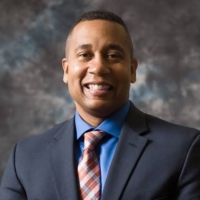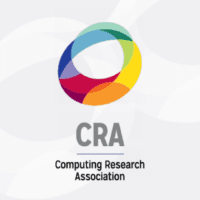Policy Spotlight: Juan E. Gilbert, University of Florida
By CRA Government Affairs
As part of CRA’s mission to help the computing research community become more aware and engaged in the policymaking that affects our field, Computing Research News’ Q&A series, Policy Spotlight: Conversations with Computing Researchers, highlights the work that community members are doing in governmental roles or who have taken part in CRA Government Affairs activities. This series will allow you to hear directly from policy-minded members of the community, in their own words, to highlight work that the community should know about and raise awareness of the types of opportunities that are available to those interested in serving.

The spotlight turns now to Juan E. Gilbert, the Banks Family Preeminent Endowed Professor and Chair of the Computer and Information Science and Engineering Department at the University of Florida, where he also leads the Computing for Social Good Lab. Dr. Gilbert has been involved in several parts of CRA, from serving on multiple leadership committees to mentoring undergraduate researchers. He has also participated in several Congressional Visit Days (CVD) that the CRA Government Affairs Office has held in Washington DC.
CRA’s CVDs, which are typically held in September, are an opportunity for members of the computing research community to come to Washington and take part in meetings with their Members of Congress and staff to help make the case for federal support of computing research. As you will read in his own words, Dr. Gilbert has leveraged his CVD participation to highlight to policy makers the work he is doing and give it a wider impact on the nation.
If you would like to participate in the 2024 CRA Congressional Visit Day, please contact Brian Mosley (bmosley@cra.org) in the Government Affairs Office for more details.
What are you working on right now in your research?
Research-wise, my lab is called the Computing for Social Good Lab and we have several different projects, but the largest, longest-term project in the lab is our voting technology projects. We build innovative solutions to real-world problems, and we do that by integrating people with technology, policy, and culture.
And so we apply that in the voting context to create universally-designed voting machines, such that if you can’t see, if you can’t hear, if you can’t read, if you don’t have arms – you can vote on the same machine as anyone else. And so right now we’re working on some new innovations in that space.
We also created something called a transparent voting machine. This technology essentially turns paper into a touchscreen. The idea is to make sure that the paper ballot that is created by the voting machine through the voter is actually voter-verified and an accurate ballot. So we’re working on that, as well as a form of internet voting called televoting. Imagine being able to vote over the internet and it results in a paper ballot being printed that you can verify.
So those are the hot projects right now – we have others as well, but those will be the top ones.
What does advocacy mean to you in the context of computing research?
Computing research advocacy is essential. Computing is pervasive. It’s everywhere. Whether you are a child, a senior, whether you’re technically competent or not – it doesn’t matter. Everybody is interfacing with computing, even if they don’t know it.
As a result of that, we have to do advocacy to promote computing research. And the most obvious thing to say is that we need advocacy in computing research for protections to enable computing to be safe in certain important contexts.
So yes, it’s just so necessary that there be advocacy for computing research because it is pervasive and it impacts people’s daily lives in all kinds of ways.
How have you used your research in your meetings with policymakers?
When I meet with policymakers, I often will tell them about our research. Again, my lab is called Computing for Social Good, and so we deal with real world problems.
Here’s an example: another project in the lab is called the Virtual Traffic Stop. Imagine being pulled over and prior to the officer approaching the vehicle, you could have a video conference with that officer and a third party of your choice. This is a way to de-escalate tensions between officers and drivers during a routine traffic stop.
So, how does this connect with talking to legislators and policymakers? You have to contextualize what our research does and how it impacts society. When you contextualize things, policymakers are able to understand the benefit to their constituents in a way that makes it real for them. Simply put, we connect our research – which is applied in the real world – to the policy makers’ constituents and to society in a way to make it compelling so they understand why they should care and why they should take the action that we’re asking them to take.
What has been your biggest accomplishment with your outreach to elected officials and their staff?
I have to say, I don’t want to take credit and say “my” biggest accomplishment, I would say “our” biggest accomplishment. Again, I work in voting technologies, and years ago there were voting machines created that did not have a paper ballot. They were just storing the ballot digitally on the voting machine.
So I had the opportunity to serve on a National Academies committee back in 2018. We released a report: Securing the Vote and Protecting American Democracy. When we released that report, we said that given the current state of technology, there’s no known way to secure a digital ballot. Therefore, we recommended that all voting should result in a paper ballot – whether that paper ballot is hand marked, whether it is through a ballot marking device, or through a computer that prints a ballot – it has to have a paper ballot.
So what I would say a big accomplishment was writing this report, working with the community, and communicating this to legislators. And now, there are very, very few, if any, of those digital-only machines being used in elections. So we made a difference, and that was a big collective accomplishment.
You’ve participated in CRA’s Fall Congressional Visit Days (CVD). Can you tell us about your experience?
Yes! From my perspective, they’re wonderful.
When I’ve gone to CRA’s Congressional Visit Days I’ve met with staffers, and occasionally the actual representative, and it’s been great to be able to interact with them face-to-face. I think it’s so important that we do this because lawmakers don’t typically have technical expertise. And so to go there and make them aware of what’s happening in my lab, the department, and the greater computing research community, and then say we’re here for you as a resource and if you have tough things you need to address in technology, call upon us. And they have actually called upon us – I’ve had the opportunity to testify before the Senate and others and provide expertise.
So I think the CRA fly-ins are critical because it’s engaging a community that needs technical expertise and they sometimes don’t know that and know where to get it. And so we do a great service in doing this. It’s very important.
What’s an example of something you learned through participating in the Congressional Visit Days that you’ve carried forward with you to inform how you approach advocacy?
I’ve learned that you have to understand the audience. Who you’re speaking with.
A lot of times researchers see research from a perspective of “I’m solving a problem, and here’s why you should care about it.” But we don’t contextualize the “why you should care about it” specifically to the policy maker. The hands-on training that you go through for CRA’s Congressional Visit Day really brings that learning to life, and was helpful to me as I’ve developed and become more confident as an advocate.
What would you say to your computing research colleagues who are unsure about taking part in a Congressional visit day or similar meetings with policymakers?
That’s a good question – there’s different ways I’ve approached having that kind of conversation. I’ve had to do it time and time again.
Often, when I’m having that kind of interaction with colleagues, it’s easy to communicate from the perspective of: “You have issues with current policies, right?” And they’ll tell you all the concerns they have, and then I’ll ask them: “Well how do the lawmakers know how to fix that?” And so I start asking questions and turn it into a conversation. And what I find is that they’ll say: “Well, everybody knows.” And I’ll say: “You have a PhD in computer science. You think they know this?”
And you see where I’m going…you get them to understand that if we don’t tell them, they’ll never know the things that we think are obvious to us in the computing research community. We have to explain it to them, and who better than you to do that? That’s how I start the conversation, and then it goes from there.
What other ways have you gotten involved with advocacy for computing research?
The number one, as you already know, is the CRA CVD. When I started to do the CRA fly-ins is when I started to learn quite a bit about engaging policymakers. And how I’ve built on that training is just by being opportunistic.
So now my frame of mind is different. I see research in a broader context and so I take advantage of opportunities to engage policy makers. So, for example, I’m in Florida. Sometimes I’ll go up to Tallahassee, meet with legislators there, and we engage them. We invite them to things. If I’m in DC, this is a major election year–you can be guaranteed I’m gonna be knocking on some doors and letting them know we’re there.
So I think you have to be a little opportunistic and you need to understand that, again, they don’t know a lot of these things and you need to make them aware that you have expertise. So what I would do is I will go and I will speak to them about research we’re doing and I will also speak to them about the benefits of computing research. So the talking points we’re given by CRA during the fly-in training, I use those all the time. So it’s just any opportunity to engage, you have to be ready.
Why do you think it’s important for members of the community to do their part as advocates?
Because, again, if we don’t, who will? And often when they answer that question of who will, they’re not happy about who the alternatives are.
So we have to do it. It’s our responsibility. We have expertise. And again, if we go back 25-30 years, computing was a different thing than it is today. The pervasiveness, the integration of computing with our lives. It has impacts. It affects people’s lives in ways that it didn’t years ago. And as a result of that we have a responsibility to communicate to policymakers about computing research and the ethics of it, the capabilities of it, and how to make things work and be cohesive with individuals in society.
What are you most looking forward to, either personally or professionally, for the remainder of 2024?
Well, it’s a Presidential election year. Our voting research is advancing. We’re about to do some studies on our voting technologies. I’m looking forward to advancing the state of the art in voting technology.
People have died for the right to vote in this country, and we are here making it a reality for everyone to vote – equitably, securely, and in a user friendly way. So, we’re working in that context. So I’m excited about the future development of our research in that area. And I’m frankly excited about the opportunity to engage with policy makers and help them understand computing research in a way to improve and better the cohesiveness between society and computing.









